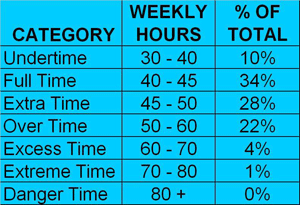We have been collectiong time study data since 1990, and have recently taken an interest in overtime hours. We were interested in what constitutes a typical work week for knowledge workers.
Our definition of knowledge workers mostly includes people who work in offices; managers, sales reps, service reps, researchers, engineers, supervisors, university faculty, municipal employees, and many others.
Our definition of a work week includes all of the work an employee is contracted to do during the day, plus overtime hours and weekend work. It includes lunch and breaks during the regular workday, but not after hours. Lunch and breaks typically take up about 4.5 hours per week, so a truer figure for work time might exclude this. Commuting is not included, because it varies by employee.
Our data includes results from TimeCorder data from time studies since 1990. Over that period of time the typical work week is 46.7 hours per week. That doesn’t sound like a massive amount. But bear in mind. If you’re working 9 to 5 every single day of the week, and then staying one extra hour right through to 6:00 p.m. every day, then you’re actually a bit below the average. And our database includes a large number of service employees who only work about 43 hours per week. Their results tend to pull the average down. Our time and motion studies show that managers work about 50 hours per week – that’s at least two solid hours of overtime every single day.
So how do overtime hours break down across large groups of employees. We’ve classified different amounts of overtime in the bar chart below. And since some full-time employees work slightly fewer than 40 hours per week, we’ve classified them as “undertime”
Excluding part time workers (i.e. those who work less than 30 hours per week), the percentage breakdown among those we have measured is as follows:

Categories of Hours Worked Per Week
We consider anything above 80 hours to be “danger time” because sustained activitiy at this level is likely to be dangerous to health, relationships, and even mental stability. Our database shows 0% for this group because our focus is on corporate employees. But there are entrepreneurs, partners, and those involved in urgent projects who occasionally work those long hours. Our best advice for those who work danger hours is: Get a life – outside of work!
Long work hours are simply not sustainable over the long term. If you’re in that group, it’s time to look at your time management for efficiencies. And you can always start by tracking your time – conduct your own personal time and motion study to measure your productivity. Sometimes awareness leads to better results. Your time is worth it.


0 Comments